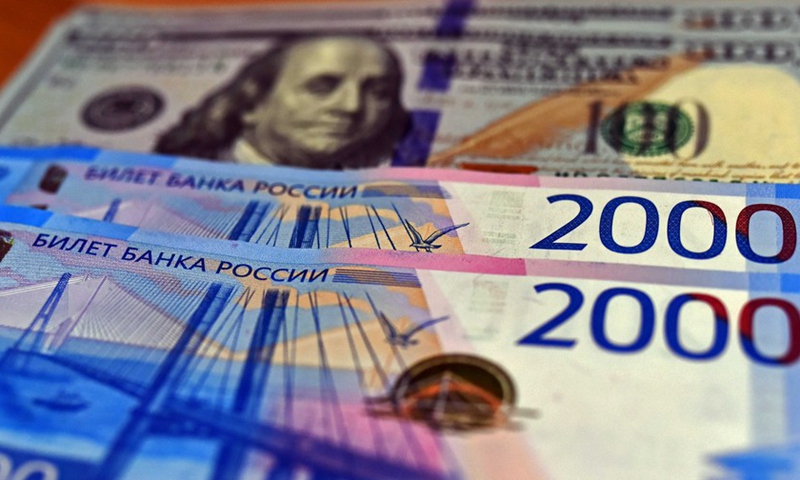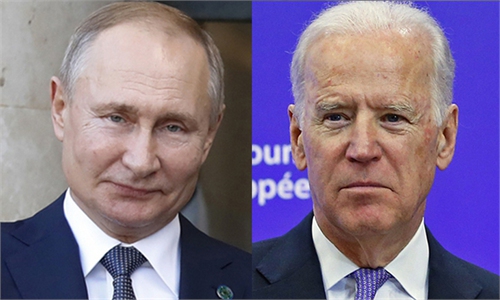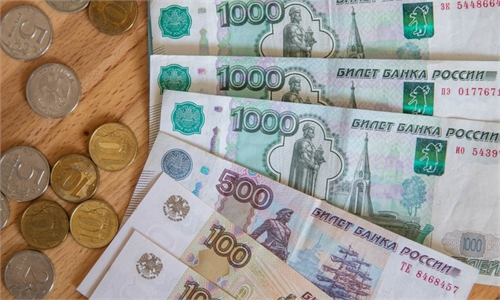
Russian ruble banknotes are seen with the US dollars in the backdrop on March 2, 2021. Photo: Xinhua
German and Italian companies, which are approaching imminent deadlines to pay for their gas supplies from Russia, were told they could open ruble accounts to keep buying Russian gas without breaching sanctions against Moscow, Reuters reported on Friday. On the same day, the Russian ruble rallied to its strongest levels against the euro and dollar since June 2015, and March 2018, respectively.
Germany and Italy's approval of Russian gas payments at the last minute adds to the latest evidence that it is not practical for European countries to stick with the US-led sanctions against Russia, and the strong ruble rally following approval from the EU members shows that the US' sanctions, which were designed to undermine Russia's financial capacity and currency, will backfire eventually.
Since the conflict between Russia and Ukraine further escalated in February 2022, to put pressure on Russia, the US and Europe have imposed more than 10,000 sanctions on Moscow. From cutting off and Russian banks from SWIFT, to prohibiting new investment, the US and Europe tried to cause domestic financial and political turmoil in Russia.
On the energy front, Western countries have introduced increasingly widespread sanctions and keep developing plans to further choke Russia's oil revenues with the long-term goal of destroying the country's central role in the global energy economy.
The US is banning all Russian oil and gas imports and the UK will phase out Russian oil imports by the end of 2022. Germany has frozen plans for the opening of the Nord Stream 2 gas pipeline from Russia and the EU has also said it will halt Russian coal imports by August this year, according to the BBC.
At the beginning of Western sanctions against Russia's financial and energy sectors, the blow to Russia was indeed significant. However, the effect of the sanctions has currently failed to meet the expectations set by the West. For instance, the exchange rate of the Russian ruble has returned to, or even exceeded, the level before the sanctions.
The US and European countries are planning a new round of stronger sanctions. The proposed package of measures, which have yet to be approved by EU members, include phasing out EU imports of Russian crude oil in six months and refined products by the end of 2022, the BBC reported.
However, the EU's proposed sanctions on Russia's energy sector have encountered more resistance within the bloc. Some member countries believe that the embargo should be made by other non-EU countries, such as the UK and the US. Hungary's prime minister, Viktor Orbán, said that his country will not block EU sanctions against Russia as long as they do not pose risks to Hungary's energy security.
Indeed, it seems it is not that easy for Western countries to find alternative energy suppliers for Russian oil and gas. Russia is the world's third biggest producer, after the US and Saudi Arabia, and about half of its crude oil exports went to Europe before sanctions were announced. Slovakia and Hungary received 96 and 58 percent of their oil imports respectively from Russia last year, according to the International Energy Agency (IEA).
US and European sanctions failed to push Russia to compromise and undermine its economy and currency and also caused a great spillover impact on global food and energy supply chains. As Russia has gain ground in the game against Western countries with a stronger ruble, the status of the dollar is further threatened. The US is seeing its sanctions on Russia biting back on its own currency and economy.
The author is a reporter with the Global Times. bizopinion@globaltimes.com.cn



